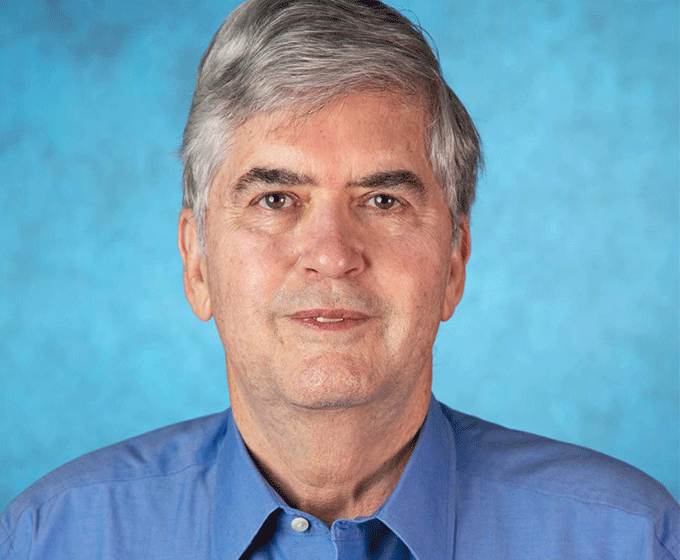
FEBRUARY 22, 2023 — The development of Alzheimer’s disease is a complex web.
Amyloid plaques are believed to be the critical driver of Alzheimer’s disease. To date, Alzheimer’s research has primarily focused on amyloid development in and around the brain.
The build-up of the protein is consistent with the onset and progression of Alzheimer’s, and many researchers believe the plaque prevent brain cells from properly functioning.
But UTSA researcher George Perry doesn’t buy it.
“Being correlated and being causative are not the same thing,” said Perry, UTSA’s Semmes Foundation Distinguished University Chair in Neurobiology. “Instead, many who study Alzheimer’s have confused causality with association.”

Aging is a normal process. The body, including the brain, is altered throughout the aging process with billions of neurons adjusting, adapting and evolving. Some changes, Perry explained, may appear abnormal but they are needed to keep the brain healthy. Amyloid is an example.
“It’s a key adjustment protein related to the aging process. Alzheimer’s is the result of this normal process failing,” Perry explained. “Amyloid is a piece of the brain’s response to aging, and I think all the disease related proteins we study in neurodegenerative diseases are how you maintain successful aging.”
Perry’s research focuses on the mechanism and physiological consequences of Alzheimer’s at the cellular level. He and his research collaborators have found that oxidative damage—an imbalance in oxygen reacting with the body’s defenses—is the initial diagnostic tool to examine cells in determining the cause or nature of Alzheimer’s disease.
The team is working to determine the sequence of events leading to the neuronal oxidative damage and the source of the increased oxygen radicals that scientists observe during cognitive decline.
“Biology doesn’t have good or bad things. It depends on the context. Free radicals and amyloid aren’t either bad or good. Everyone develops amyloid and oxidative stress in their late 30s, whether or not they will develop Alzheimer’s. Surprisingly amyloid reduces oxidative stress by blocking free radical formation. Based on the antioxidant activity of amyloid, we predicted over 20 years ago that amyloid removal would not benefit patients,” Perry said.
Alzheimer’s has no cure. However, prevention and lifestyle modification can greatly reduce risk, Perry noted. The multidisciplinary studies of UTSA’s Brain Health Consortium are essential to benefiting patients and families living with Alzheimer’s disease.
“How many chronic age-related diseases are cured? Few if any. Arthritis? Heart disease? The best medicine can do is to slow them down,” Perry said.
UTSA Today is produced by University Communications and Marketing, the official news source of The University of Texas at San Antonio. Send your feedback to news@utsa.edu. Keep up-to-date on UTSA news by visiting UTSA Today. Connect with UTSA online at Facebook, Twitter, Youtube and Instagram.
Move In To COLFA is strongly recommended for new students in COLFA. It gives you the chance to learn about the Student Success Center, campus resources and meet new friends!
Academic Classroom: Lecture Hall (MH 2.01.10,) McKinney Humanities BldgWe invite you to join us for Birds Up! Downtown, an exciting welcome back event designed to connect students with the different departments at the Downtown Campus. Students will have the opportunity to learn about some of the departments on campus, gain access to different resources, and collect some giveaways!
Bill Miller PlazaJoin us for an intimate evening of cocktails, conversation, and culinary inspiration with Pati Jinich, Emmy-nominated chef and James Beard Award-winning author. Enjoy light bites and signature drinks in the warm, modern setting of Mezquite as Pati connects with guests over her passion for Mexican cuisine and storytelling.
Mezquite Restaurant in Pullman Market, 221 Newell Ave., San Antonio 78215From inspired courses to thoughtful pairings and a rich sense of community, the Ven a Comer Signature Dinner is a night of shared meals, shared stories, and unforgettable flavor.
Stable Hall (Pear Brewery), 307 Pearl Pkwy, San Antonio 78215Come and celebrate this year's homecoming at the Downtown Campus with food, games, giveaways, music, and more. We look forward to seeing your Roadrunner Spirit!
Bill Miller PlazaThe University of Texas at San Antonio is dedicated to the advancement of knowledge through research and discovery, teaching and learning, community engagement and public service. As an institution of access and excellence, UTSA embraces multicultural traditions and serves as a center for intellectual and creative resources as well as a catalyst for socioeconomic development and the commercialization of intellectual property - for Texas, the nation and the world.
To be a premier public research university, providing access to educational excellence and preparing citizen leaders for the global environment.
We encourage an environment of dialogue and discovery, where integrity, excellence, respect, collaboration and innovation are fostered.